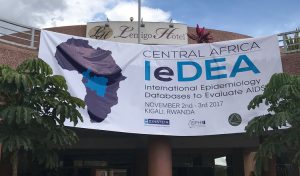A group of researchers, led by the CUNY ISPH, published a consensus statement on research priorities to inform the implementation of universal HIV treatment programs in sub-Saharan Africa (SSA) in the latest issue of the Journal of the International AIDS Society (JIAS). The article distills the outcomes of a research prioritization process involving over 200 researchers, implementation experts, policy/decision-makers, and HIV community representatives working in East, Central, Southern and West Africa who were convened by the IeDEA Consortium at a 2017 meeting in Kigali, Rwanda. SSA is home to over 25 million people living with HIV, 10 million of whom are undiagnosed and/or untreated.
In September 2015, the World Health Organization released guidelines to treat all individuals upon diagnosis of HIV, regardless of CD4 cell count. Colloquially known as “Treat All,” this approach is essential to achieve the 2014 Joint United Nations Programme on HIV/AIDS (UNAIDS) 90-90-90 targets: 90% of people living with HIV are diagnosed; 90% of people diagnosed with HIV are treated; 90% of people being treated achieve viral suppression. Treat All policies have been adopted in many countries around the world, including most countries in SSA. However, the rates of new HIV diagnosis, the number of undiagnosed and untreated HIV infection, and HIV-related mortality highlight a substantially higher unmet need in SSA than elsewhere, underscoring a need for focused research to inform implementation efforts.
“With 10.3 million people untreated and a projected 1.2 million people acquiring HIV infections per year in sub-Saharan Africa, the current and anticipated unmet need for HIV treatment is substantial,” said Dr. Denis Nash, Executive Director of the CUNY Institute for Implementation Science in Population Health and the study’s senior author. “The ‘Treat All’ era presents strategic opportunities and massive potential for health systems to substantially reduce AIDS-related mortality and HIV incidence in the region.”
A high degree of consensus was ultimately reached around nine research priorities focused in three broad areas:
- The importance of generating critical metrics and estimates to inform policies, planning, monitoring and evaluation of Treat All implementation.
- The need for focused intervention effectiveness trials and economic evaluations to improve roll-out of Treat All.
- The importance of focusing on key populations and groups who remain under-served along each element of the HIV care cascade to better understand and meet their preferences through evidence-informed strategies and models of care.
“These research priorities highlight important evidence gaps that are directly relevant for ministries of health, funders, normative bodies and other research networks. Our hope is that they will be considered, adapted, and taken up as part of local research agendas to generate critical evidence at the national and sub-national levels,” said Dr. Marcel Yotebieng, Associate Professor of Epidemiology at The Ohio State University and the study’s lead author.
This consensus statement follows the recent publication of a special issue of the Journal of Virus Eradication published by the IeDEA Consortium, which includes eight articles focused on issues critical to ensuring the success and impact of ‘Treat All’ implementation in SSA.
“We have entered a new era in the response to the HIV epidemic in sub-Saharan Africa. And this new era, combined with the scale of the HIV epidemic in the region, demands new evidence-based approaches capable of optimizing the impact of program implementation,” said Nash.
Funding
Research reported in this publication was supported by: National Institute of Allergy and Infectious Diseases of the National Institutes of Health under Award Numbers R13AI134393, U01AI096299 (IeDEA Central Africa) and U01AI069924 (IeDEA Southern Africa), National Institute of Allergy and Infectious Diseases, the Eunice Kennedy Shriver National Institute of Child Health and Human Development, the National Cancer Institute, and the National Institute of Mental Health under Award Number U01AI069919 (IeDEA West Africa), National Institute of Allergy and Infectious Diseases, Eunice Kennedy Shriver National Institute of Child Health and Human Development, the National Institute on Drug Abuse, the National Cancer Institute, and the National Institute of Mental Health under Award Number U01AI069911 (IeDEA East Africa), End AIDS Coalition (Thomas LaSalvia), NIH Office of AIDS Research (OAR), Einstein-Rockefeller-CUNY Center for AIDS Research (CFAR) grant (P30 AI124414), HIV Center for Clinical and Behavioral Studies grant (P30 MH043520), Institute for Implementation Science in Population Health, City University of New York.
About the Institute for Implementation Science in Population Health at the City University of New York.
The CUNY Institute for Implementation Science in Population Health (ISPH) was founded on the notion that substantial improvements in population health can be efficiently achieved through better implementation of existing strategies, policies, and interventions across multiple sectors. We study how to translate and scale-up evidence-based interventions and policies within clinical and community settings in order to improve population health and reduce health disparities. CUNY ISPH. Pursuing population health gains through better implementation. www.cunyisph.org Follow us on Twitter: @CUNYISPH.
For more information, contact:
Denis Nash, PhD
Distinguished Professor of Epidemiology, CUNY School of Public Health
Executive Director, CUNY Institute for Implementation Science
347-331-6554
[email protected]
Citation:
Yotebieng M, Brazier E, Addison D, Kimmel AD, Cornell M, Keiser O, Parcesepe AM, Onovo A, Lancaster KE, Castelnuovo B, Murnane PM, Cohen CR, Vreeman RC, Davies MA, Duda SN, Yiannoutsos CT, Bono RS, Agler R, Bernard C, Syvertsen JL, Sinayobye JD, Wikramanayake R, Sohn AH, von Groote PM, Wandeler G, Leroy V, Williams CF, Wools-Kaloustian K, Nash D; IeDEA Treat All in sub-Saharan Africa Consensus Statement Working Group. Research priorities to inform “Treat All” policy implementation for people living with HIV in sub-Saharan Africa: a consensus statement from the International epidemiology Databases to Evaluate AIDS (IeDEA). J Int AIDS Soc. 2019 Jan;22(1):e25218. doi: 10.1002/jia2.25218. Link to article >>
